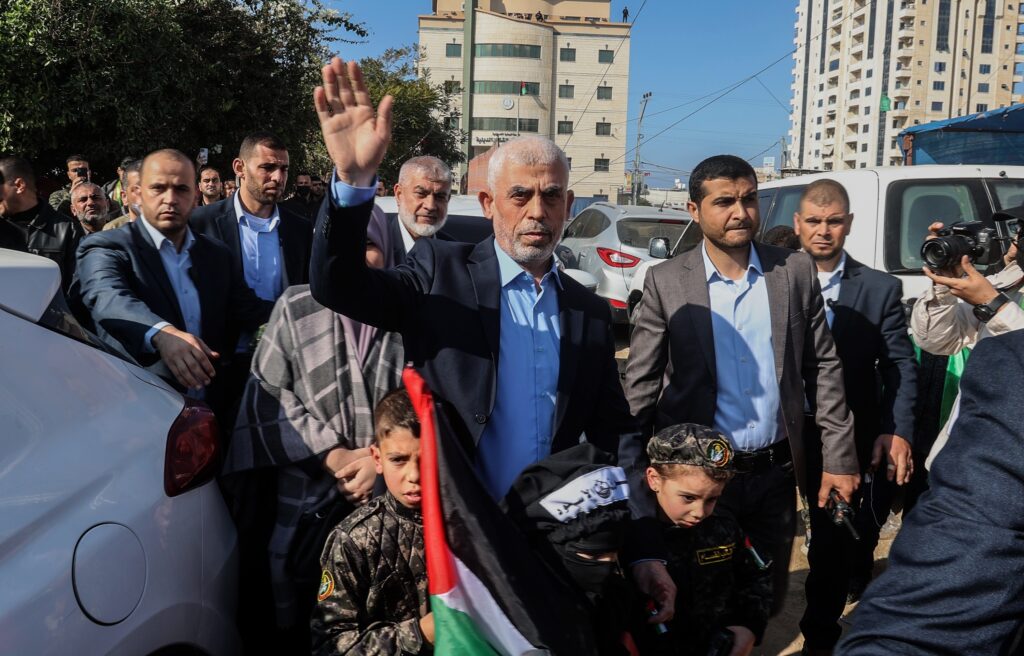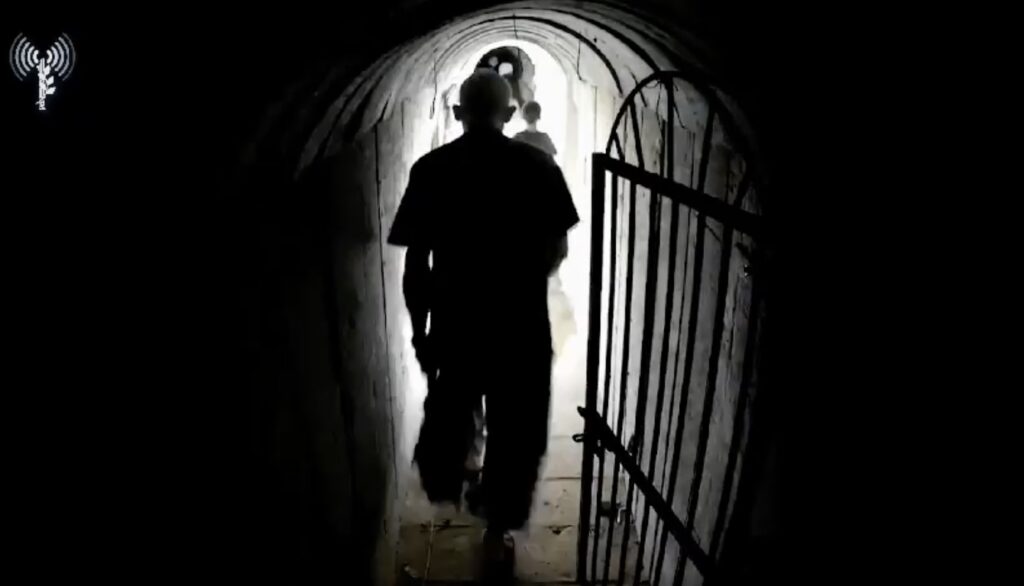Australia/Israel Review
Demented or just diabolical
Apr 26, 2024 | Judith Miller

Inside the mind of Yayha Sinwar
The Palestinian in the clinic at one of Israel’s highest security prisons near Beersheba had a persistent pain in the back of his neck. He trembled and had trouble walking. Yuval Bitton, then a 28-year-old dentist just a year out of medical school, suspected that his patient might be suffering from a CVA, an ischemic cerebrovascular accident, resulting from a life-threatening brain tumour. “He needs to be hospitalised, immediately,” Bitton advised the prison doctors.
Dr Bitton’s diagnosis was quickly confirmed at the Soroka Medical Centre in Beersheba. The surgery took hours. The prisoner survived. When he returned to the prison, he thanked Bitton and the rest of the prison medical staff for having saved his life – in excellent Hebrew.
The year was 2004. The patient was Yahya Sinwar, the Palestinian who in 2017 would become the leader of Hamas in Gaza and subsequently the mastermind of the October 7 attack in southern Israel in which 1,200 mostly Israeli civilians died and 240 were taken hostage.
Bitton described the fateful incident and what he said were “hundreds of hours” of conversations with Sinwar in prison in the ensuing years when I met him last week in a peaceful garden in a Tel Aviv suburb, a world away from the Israeli prisons in which the Hamas leader was held for 22 years prior to his release in 2011.
“Even then, he looked and carried himself like a leader,” Bitton recalled. “He was thin, tough, and very extreme.” There was tension in jail between the militant Islamists of Gaza and those from the West Bank, which was ruled by the Palestinian Authority initially headed by Yasser Arafat and then by his successor, Mahmoud Abbas. Sinwar viewed even the most militant members of the Palestinian Authority as soft and undisciplined. Above all, they were traitors to Islam for having agreed to share with the Jews the holy land that God had given exclusively to Muslims.
Sinwar and his lieutenants, Tawfik Abu Naim and Rawhi Mushtaha, now all senior Hamas figures, were “like an army” inside the prison, Bitton recalled. An Islamic band of brothers, they enforced rules, gave orders, and held secret elections for Hamas’ “majlis”, its ruling council inside the prison. They communicated with one another and with fellow militants outside the jail through messages and tiny plastic cell phones smuggled into the jail by visitors – lawyers, wives, babies. The contraband was concealed in diapers, in women’s bras, and in their vaginas.
“In those days, we didn’t routinely or thoroughly search women or babies or even surveil conversations between lawyers and their clients,” Bitton said, recalling these early examples of suicidal democracy. “We were so naive.”
Sinwar studied his enemy assiduously. He read Israeli newspapers, took classes in Jewish history through the prison’s “open university”, and spoke to Bitton about Hamas’ goals – the expulsion of all Jews from Palestine, the duty to implement God’s laws as given to Muhammad on all sacred Muslim soil. Numerous efforts to recruit him in prison failed. “The struggle continued inside the prison,” Bitton said. Sinwar was not married then, and he had few visitors. “Hamas and the struggle were his life.”
Sinwar’s life has been shaped by the Palestinian-Israeli conflict. Born in 1962 in the Khan Younis refugee camp in Egyptian-ruled Gaza, he got his bachelor’s degree in Arabic studies from the Islamic University of Gaza, which was founded in 1978 by two men who a decade later would create Hamas. He grew close to one of them – Sheikh Ahmed Yassin, Hamas’ co-founder and spiritual guide – and rose quickly in the Hamas ranks.
Having initially been arrested in 1982 for what Israel termed subversive activities, he was re-arrested in 1985. Released again, he and Mushtaha founded Munazzamat al Jihad w’al-Dawa (MAJD), an organisation responsible for rooting out Palestinian collaborators with Israel and other rival factions. Sinwar excelled at his job, earning himself the nickname “Butcher of Khan Yunis.” In 1988, he was arrested again for planning the abduction and killing of two Israeli soldiers and the murder of four Palestinians he considered collaborators. According to Israeli press accounts, he had acknowledged during his interrogation having strangled two of the Palestinians, inadvertently killing another during his interrogation, and shooting the fourth who had tried to escape. He was said to have led investigators to the orchard where the bodies were buried. In 1989, Israel sentenced him to four life sentences.
Under normal circumstances, a man with such a violent resume would not have been released. But after Israeli Staff Sergeant (then-Corporal) Gilad Shalit was kidnapped in 2006, negotiations with Hamas inside and outside of prisons began. Bitton himself was involved in the talks with Sinwar and other Hamas negotiators. Brokered by German and Egyptian mediators and signed in Cairo in 2011, the deal agreed to Shalit’s return in exchange for the phased release of 1,027 Israeli-held prisoners, including some 315 Palestinians who were serving life sentences for having been convicted of the worst crimes. Among them were Sinwar and his two lieutenants.
Hamas’ leaders considered Israel’s willingness to release more than 1,000 Palestinians for a single Israeli soldier a victory. Most of the prisoners were ecstatic about their release. But Sinwar denounced the trade. “He was furious, even though he was among those scheduled to be released,” Bitton recalled. He told me that releasing Shalit for a thousand Palestinian prisoners was “not enough”. All of the Palestinians in Israeli jails had to be released. He sent messages to Hamas’ leaders in exile urging them to reject the deal. But he was overruled by Saleh al-Arouri, a senior Hamas leader and the founding commander of its military wing, the Izz ad-Din al-Qassem Brigades (Israel assassinated al-Arouri in Beirut on Jan. 2, 2024).
“Sinwar didn’t care how many Palestinians would die for their cause,” Bitton recalled. For Sinwar, “there was no flexibility, no room for compromise.”
While some Hamas leaders were political, Sinwar thought only about military operations and war. “He was always crystal clear: The struggle against the Jewish state must continue, no matter what he had to do.” If it meant agreeing to close the tunnels between Egypt and Gaza and arresting jihadists suspected by Cairo to enhance security coordination with Egypt, a main supply route to Gaza, that was fine. If it meant trying to reconcile with the Palestinian Authority, which Hamas had violently ousted from Gaza in 2007, by temporarily renouncing violence to pursue “peaceful, popular resistance” to Israeli occupation, which he also did in 2018, so be it. If it meant appearing on Israeli TV to call for a truce with Hamas, in Hebrew, he volunteered. His objective never wavered, though: Do whatever must be done to fight another day and free all Palestinians from jail. Sinwar believed that Israel’s prisons were “a grave for us. A mill to grind our will, determination, and bodies,” he said after his own release.
Having spent hours listening to Sinwar, Bitton had vigorously opposed his release, he disclosed. “I knew he was trouble, and that he would create even more trouble for us outside,” he told me. But he, too, was overruled by higher authorities – in this case, the Shabak, Israel’s domestic intelligence service, then headed by Yuval Diskin. “I wasn’t the head of Shabak,” he said somewhat ruefully. “I was just the head of intelligence in a prison.”
Days after his release, Sinwar publicly blasted the deal he had opposed in jail. He also urged Palestinians to kidnap more soldiers to secure the release of his Islamic brothers in jail. “He told me that he had an Islamic duty to ensure that no Islamic fighter would be left behind,” Bitton recalls.
Bitton ultimately paid a personal price for the decision to let Sinwar go free. His 38-year-old nephew Tamir was wounded, kidnapped, and killed by the Hamas terrorists Sinwar sent to southern Gaza on October 7. “I knew when I saw the photo of Tamir that he wouldn’t make it,” he said. “There was too much blood.”
Three weeks after October 7, Sinwar once again proposed that all Palestinians in Israeli jails be released in exchange for the hostages Hamas had kidnapped during its killing spree and barbaric assault. Israeli Prime Minister Binyamin Netanyahu’s rejection was fast and furious. Sinwar, Netanyahu said, was a “dead man walking”, vowing to kill Israel’s No. 1 target in its massive offensive. Israel offered a bounty of $400,000 for information about his location. But Sinwar has so far escaped Israel’s wrath.
Last November, the Israeli Defence Forces claimed to have trapped the Hamas commander in an underground bunker after surrounding Gaza City. He escaped. Later, Israeli officials claimed he was in a tunnel in Khan Yunis. Social media carried photos at the time of a shadowy figure fleeing into a tunnel with his children and the wife he had married after his release from jail. Again, he escaped.

A photo captured by Israeli forces apparently showing Sinwar escaping through a tunnel (Image: IDF/screenshot)
The Israelis now say he is moving constantly within the tunnel network in Rafah, Gaza’s southernmost city where 1.2 million Palestinians have fled for safety. His presence there, and Israel’s assertion that four Hamas battalions remain there ready to fight, are part of the justification Israel has offered for its planned land offensive in Rafah, Gaza’s main supply area on the Egyptian border. Israel’s military claims to have destroyed or damaged 19 of Hamas’ 24 battalions, each consisting of about 1,000 soldiers.
The Wall Street Journal reported on Feb. 29 that Sinwar had sent a message to exiled leaders claiming that Hamas was winning the war in Gaza and that international pressure would soon force Israel to stop the fighting because of the high civilian death toll, which according to unverifiable Hamas and United Nations estimates, now stands at over 33,000 Palestinians. Israel estimates that it has killed approximately 13,000 Hamas fighters.
Safe in Qatar and Turkey, Hamas’ leadership outside Gaza took a different view: They concluded that Israel was crushing the group and seizing ever more ground, despite increasing pressure from the West for Israel to agree to a cease-fire. Yet according to the Journal, Sinwar assured his confederates that despite Israel’s tactical successes, Hamas’ four remaining battalions in Rafah were fully prepared to withstand a likely ground assault, and that Israel would ultimately yield to Hamas’ demands.
According to the Journal, Egyptian intelligence officials who have received Sinwar’s messages think he has “lost touch with reality.” Yet the success of Sinwar’s bloody October 7 offensive and his presence on (or under) the ground in Gaza gives him credibility and authority that Hamas’ external leadership lacks. Practically speaking, the fighting will end when Sinwar says it does, so his assessment of Hamas’ strategic position and of Israeli psychology is the one that matters.
Whether Sinwar has become demented or merely diabolical, Bitton said, the Hamas leader’s hard-line stance does not surprise him. In his desire to rid Palestine of Jews for good, Sinwar has been nothing if not consistent.
Judith Miller is a former New York Times Cairo bureau chief and investigative reporter. She is also the author of the memoir The Story: A Reporter’s Journey. This article is reprinted from Tablet Magazine, at tabletmag.com, the online magazine of Jewish news, ideas, and culture. © Tablet Magazine, reprinted by permission, all rights reserved.
Tags: Gaza, Hamas, Israel, Yahya Sinwar






